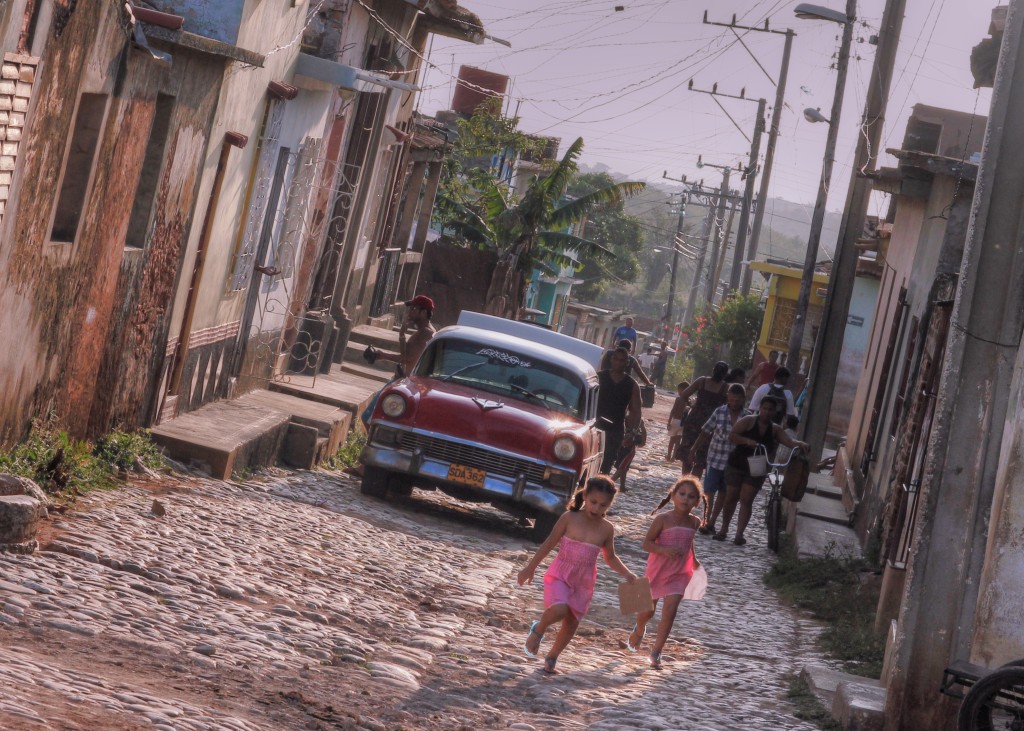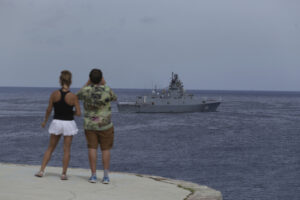From Havana, With Love

Photograph by Doug Wheller | Flickr

[A version of this was originally posted here]
“Hello, happy holidays!”
On the cobblestone streets that skirt Plaza de la Catedral and Plaza de Armas, this phrase is ubiquitous. Cubans often hurl it at passing tourists irrespective of the season. To Americans, the moment may seem like an opportunity to laugh. Look how out of touch Cubans are, they might say.
Digging a bit deeper, a more troublesome reality comes to light: the United States and Cuba are on completely different wavelengths. The failure of Cubans and Americans to connect over a simple greeting is a microcosm. As the U.S. and Cuba grow closer politically, the way Americans have been conditioned to view Cuban society is no longer accurate.
Cuba is not the static, backward country often represented in the U.S. media. And the persistence of this antiquated narrative is a social problem for the United States. If Washington hopes to normalize relations with Cuba any time soon, efforts must begin by tabling the paradigm on the home front.
Every winter, Canadian snowbirds flock to Cuba to escape the frozen tundra of their homeland. This has influenced not only the Cuban economy but also their society. Canadians’ propensity, for instance, to call their vacation a holiday is likely the explanation for the popularity of the phrase “happy holidays”—wishing tourists a happy vacation.
Cuba remains one of the only bastions of tourism that has successfully avoided U.S. influence. But U.S. travelers are ill-equipped to understand this reality. A chuckle or remark about how out of touch Cubans are would be better served if directed inwardly: the U.S. is out of touch. Cuba has a booming tourism industry and is influenced by face-to-face contact with other cultures. These are details the U.S. narrative fails to encapsulate.
The island is also represented as a Cold War relic—a characterization that fails on two accounts. First, it suggests that Cuba has undergone no economic change, when in fact it has been extremely dynamic. Second, it implies that, with the U.S. embargo and lack of influence, Cuba is backward and stuck in a social time warp. Economically, Cuba went from relying heavily on Soviet imports, to a restructuring during the “Special Period” of the’90s, to a burgeoning private sector in the 21st century. Also, Cuba’s human rights record—specifically with respect to LGBT rights—has drastically improved since the early years of the revolution. Unfortunately, change according to the Helms Burton Act explicitly means a different political regime (§ 205 (a) (7)). This definition is both a product of and contributor to the U.S. misperception of what change means for Cuba.
To support claims that Cuba is somehow undeveloped, authors point to the World Bank statistic showing that only 25 percent of Cubans have Internet access. This assumes, though, that only those with access to the web can access information. In fact, Cubans have found a workaround. El paquete semanal, or the weekly package, is a one-terabyte hard drive distributed on the black market that includes the most recent television shows, movies, games, documentaries, and information from around the world. Prices vary from 10 Cuban pesos ($0.40 USD) to $10 USD depending on the amount of content and the type of package. While many Cubans lack Internet, el paquete broadens access to entertainment and information. Since this is not reflected in statistics, the official U.S. narrative is incomplete at best. It is access to information, rather than the Internet, that brings modernity. And the Cuban people have access to information—albeit in an extralegal way.
Normalizing U.S.-Cuban relations may be a diplomatic endeavor, but the importance of public opinion in the United States cannot be overstated. It will take an act of congress to dismantle the trade embargo completely, and Americans continue to elect senators and congressmen that espouse an antiquated view on the Cuban issue. They represent major barriers to normalization. If President Obama is serious about pursuing strategies to throw out a policy that began just one year after he was born, he must change how Cuba is envisaged in the U.S. imagination. If not, a “happy holiday” in Cuba for U.S. citizens might remain a dream.
Dylan is a first year M.A. student in International Relations. He graduated magna cum laude from the University of San Diego in 2013, with a B.A. in International Relations & Spanish. His primary areas of interest include human rights, rule of law, and political and economic development in Latin America. Some of his prior research experiences include working for the University of San Diego’s Trans-Border Institute analyzing rule of law in Mexico and U.S.-Mexico relations, and traveling to Nicaragua as a USD Changemaker Scholar to pursue his senior thesis. Dylan has traveled extensively throughout the region including stints in Chile, Mexico, and Guatemala. He is a passionate writer, and enthusiastic to be a part of JPI.




